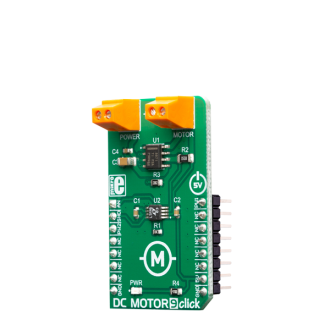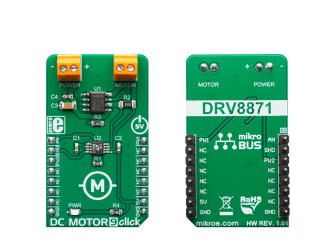
We strongly encourage users to use Package manager for sharing their code on Libstock website, because it boosts your efficiency and leaves the end user with no room for error. [more info]

Rating:
Author: MIKROE
Last Updated: 2019-03-25
Package Version: 1.0.0.0
mikroSDK Library: 1.0.0.0
Category: Brushed
Downloaded: 5658 times
Not followed.
License: MIT license
DC Motor 9 Click is a brushed DC motor driver with the current limiting and current sensing. It is based on the DRV8871, an integrated H-Bridge driver IC, optimized for motor driving applications.
Do you want to subscribe in order to receive notifications regarding "DC MOTOR 9 click" changes.
Do you want to unsubscribe in order to stop receiving notifications regarding "DC MOTOR 9 click" changes.
Do you want to report abuse regarding "DC MOTOR 9 click".


Library Description
Library contains functions for setting CS and RST pins to HIGH or LOW level.
Key functions:
void dcmotor9_csSet( uint8_t pinState ) - Sets CS pin state to HIGH or LOW.void dcmotor9_rstSet( uint8_t pinState ) - Sets CS pin state to HIGH or LOW.Examples description
The application is composed of the three sections :
void applicationTask( )
{
_adcValue = dcmotor9_adcRead( );
WordToStr( _adcValue, text );
mikrobus_logWrite( text, _LOG_TEXT );
mikrobus_logWrite( " ", _LOG_LINE );
Delay_ms(750);
}
Additional Functions :
dcmotor9_init( ) - Initializes PWM and ADC.dcmotor9_getVoltAmper( float adcRef ) - Performs ADC measurements and converts them to values of current and voltage.Notes:
Other mikroE Libraries used in the example:
ADCPWMUARTConversionsAdditional notes and informations
Depending on the development board you are using, you may need USB UART click, USB UART 2 click or RS232 click to connect to your PC, for development systems with no UART to USB interface available on the board. The terminal available in all MikroElektronika compilers, or any other terminal application of your choice, can be used to read the message.